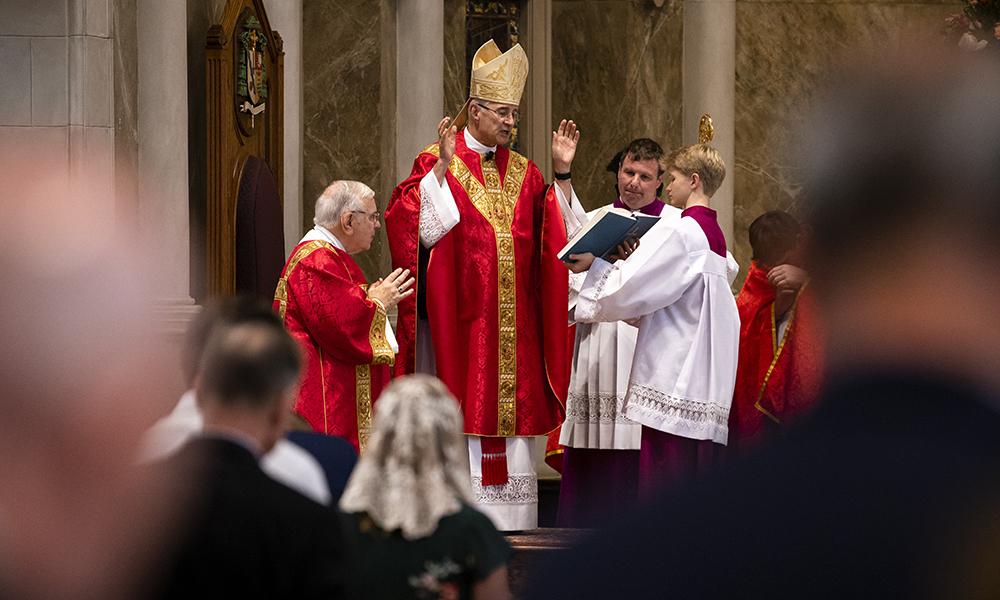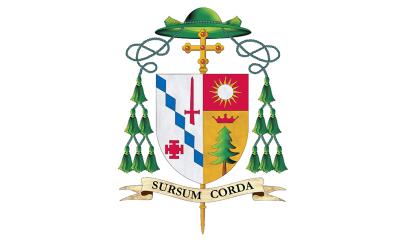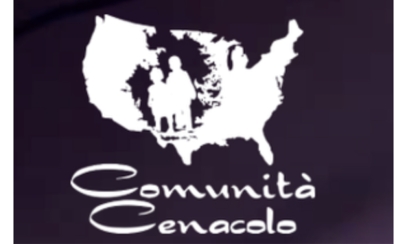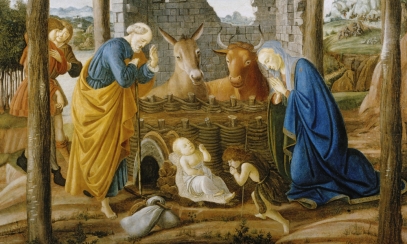
Lost and Found
Bishop Gives Lesson to Students at Start of School Year
Bishop Gives Lesson to Students at Start of School Year
On Sept. 11 Bishop Raica celebrated a Mass of the Holy Spirit at the Cathedral of St. Paul. All schoolchildren of the diocese were invited to attend. At the end of Mass, the bishop bestowed a blessing upon the children, praying, "Lord God, your Spirit of wisdom fills the earth and teaches us Your ways. Look upon these students. Let them enjoy learning and take delight in new discoveries. Help them to persevere in their studies and give them the desire to learn all things well. Look upon these teachers. Let them strive to share their knowledge with gentle patience and endeavor always to bring the truth to eager minds. Grant that students and teachers alike may follow Jesus Christ, the Way, the Truth, and the Life, for ever and ever. Amen." The complete text of the bishop’s homily follows herein.
On Sept. 11 Bishop Raica celebrated a Mass of the Holy Spirit at the Cathedral of St. Paul. All schoolchildren of the diocese were invited to attend. At the end of Mass, the bishop bestowed a blessing upon the children, praying, "Lord God, your Spirit of wisdom fills the earth and teaches us Your ways. Look upon these students. Let them enjoy learning and take delight in new discoveries. Help them to persevere in their studies and give them the desire to learn all things well. Look upon these teachers. Let them strive to share their knowledge with gentle patience and endeavor always to bring the truth to eager minds. Grant that students and teachers alike may follow Jesus Christ, the Way, the Truth, and the Life, for ever and ever. Amen." The complete text of the bishop’s homily follows herein.
My dear students, families, and friends, today, our thoughts go back to Sept. 11, 2001. “9-11” we called it. It was one of the defining moments of our nation. We who lived through it recall exactly what we were doing at that moment. Living and working in Italy at the time, one of my staff members approached me during our moments of silence a few days later, saying to me: “Monsignor, if America is not free, we Italians are not free.” I was deeply touched by her words and have reflected on them often. It was a day that American society and our relationship with the world changed. Tragic and devastating events define and refine our understanding of the human person in society – what are our freedoms, rights, and responsibilities. What is right and what is wrong. What is grace and what is sin. What is our moral imperative and duty toward our neighbor!
So, today, we gather with students from around the diocese and their families as we offer this Mass of the Holy Spirit near the beginning of the academic year. As is customary in our Catholic tradition and heritage, we invoke the aid of the Holy Spirit on our lives and on our academic endeavors, that the gifts of the Spirit may aid us in our knowledge, understanding, wisdom, and courage. It is this same Spirit, that has the power to bring one to life, to purify, to ignite a passion for our humanity and the world. Recreate us anew, Holy Spirit in this time when our senses are dulled or distracted. Help us to appreciate our freedom to live for you and know the fullness of life while respecting each other.
Education and formation are close to the heart of the Church because of the moral obligation we have to form ourselves academically, physically, and spiritually. Forming the mind, body, and soul is like a three-legged stool that rounds out our human growth – with life itself – in which we become ourselves as God created us and about which He dreams. Thank you for being with us today.
Today’s readings help us to focus on the realization of what it’s like to know ourselves at a deeper, personal level. The anxiety, worry, restlessness of being lost to the inner peace that results from being found. That is the focus of our reflection today.
Lost and found. Strayed and returned. Estranged and reconciled. In one way or another, the idea of separation and reunion – getting back together - is at the very heart of all our readings this weekend. It has a particular focus of separation from God and getting re-connected again.
How important it is to recognize something familiar, to hear a familiar voice! Not any voice will do. No, we know the voice of mom or dad, even if we can’t see them directly. Mom and dad know my voice, too. It is a moment of belonging. No matter what, that is at the heart of our relationship with family and with the family of God.
The Gospel stories reflect this important idea of belonging. Three unique episodes are given: the lost sheep, the lost coin, and the prodigal Son. Once the lost is found, we hear, “Rejoice with me because I have found my lost sheep / coin!”
The evocative story of the Prodigal Son is the third story in this trilogy. Similarly, it illustrates how, despite the wayward tendencies of the older son, the father kept on fulfilling his duty in love. He was always looking for, reaching out for, waiting for, the return of his son. But he would not force the wayward son to return – he had to return freely. From a coin to a sheep, to a son –- something inanimate, an animal, to a person – the growing gift of being part of something lost, something found begins to be understood at a deeper level. In a similar way, God reaches out to each of us. It is not that we have to search for God. In the person of Christ – the Way, Truth, and Life – that presence is already here. It desires to grasp each of us by the hand and accompany us on the journey of life. What was one person worth? To God, one is worth more than the value of our chemical composition. It is everything.
Perhaps, there are times in our own lives when we have felt, somehow or other, abandoned by God! Have we perhaps felt that we are alone or that because of my past, God could never love me? Rather than keeping our eyes fixed on the only One who could help, we turn to other things and dabble in astrology, illicit drugs, alcohol, violence, accumulation of things, to name a few. One of the things I notice more and more as I go around our diocese is the proliferation of storage facilities where you can store your stuff. Some of the staff people who work there tell me most of it is rarely, if ever, touched. We seemingly have a need to think that if I can’t have a relationship with another person, I can try to get the attention or security I look for from having “stuff” – and more “stuff.” We know deep down, though, that this can never replace the love that God has for us. We are worth more!
St. Paul, in the second reading summarizes his past history. Giving witness, St. Paul admits that he was a sinner of the first rank before his conversion: a “blasphemer, a persecutor, a man filled with arrogance …” Yet, there was an encounter with Christ that changed everything for him. He re-ordered his life and became an intrepid evangelizer. He recognized that he was lost – and now found.
Why are these stories recounted? They are not significant on the global scheme of things. We look around the world, and we see a lot of people in our global village today – several billion. Our worth can easily be devalued for the sake of pleasure, convenience, or utility. What can be identified as a real tragedy involving pain and anguish on a personal level seems to become a mere statistic in societal order, separated from humanity. One of the things we desire most is to be wanted and to be loved and be able to love. We don’t want to slip through the cracks. We want to make a difference and mean something, even though our names may never appear in lights on a Broadway marquis or a TV documentary. Whether we think of ourselves as somehow lost or, because of our sins and weaknesses, think of ourselves as somehow lost in a crowd, it is God who will find us. St. John Paul II, visiting Krakow, addressed a group of young people who gathered outside his residence window late one night and exhorted them: “Allow yourselves to be found by Christ!” It is God who extends His tender mercy, His loving embrace, His salvation lifting us up. It is God Who calls us by name; calls us to a hope and a future. This hope becomes an immense certainty.
Sin is real; it cannot be denied. That is why there is salvation with its many synonyms: found, returned, forgiven, reconciled, redeemed, saved. We are worth everything to God. This is the heart of our Good News today. Some years ago, there was a popular series on TV called “Lost,” which somehow described our wayward search for something. Perhaps we should keep our minds fixed on a sequel that is so beautifully illustrated for us today in our readings: Let’s just call it “Found,” for, that is the heart of who we are as Christians.



